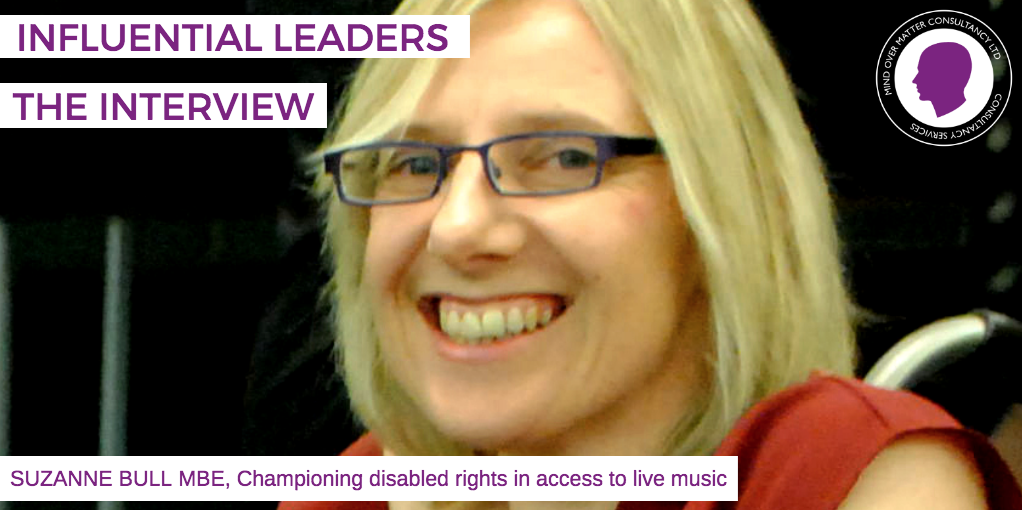SUZANNE BULL MBE

Suzanne Bull MBE was appointed Chief Executive Officer of Attitude is Everything in 2008 after spending 7 and a half years being its Project Manager.
She is disabled and has both a personal and professional interest in improving access to live music.
Attitude is Everything improves Deaf and Disabled people’s access to live music by working in partnership with the audience, artists, and the music industry. Their Vision is that Deaf and Disabled People can be audience members, employees or artists at any live music event of their choice: music without barriers.
She was honoured with an MBE in the Queen’s Birthday Honours list in June 2013 for services to music, arts, and disabled people. She was also awarded Access All Areas Editor’s Award at the Event Production Awards 2015.
In February 2017, she was appointed as one of the Minister for Disabled People, Work and Health’s Sector Champions, who help to tackles the issues disabled people face as consumers.
Suzanne represents the music industry, and she will use her influential status as a leader in her industry to promote the benefits of being inclusive of disabled people.
In May 2017, she was listed in Power 100 – Britain’s most influential disabled people. This is the third time that she has been placed on the list.
Suzanne has also been named in the 2017 Women in Music Roll of Honour. The Roll Of Honour includes game-changing females, from across the industry, including Suzanne Bull, with this year’s list including executives from labels, publishers, the live sector and beyond.
The annual Women In Music event will be hosted by BBC Radio 1’s Alice Levine on Friday, November 10 at The Brewery In London.
Attitude is Everything now serves 165,000 disabled people going to 130 venues and festivals.
Suzanne, welcome to the Leadership interview.
How do you start your day?
A good, healthy breakfast and a double check through the diary for the day, I hate being disorganised!
What was your first job and what is the worst job you’ve ever done?
My first “proper” job was Shape Ticket Scheme Assistant, a theatre and arts booking service for deaf and disabled people in London.
I loved it and it set me up with a great understanding of the barriers that disabled people face when trying to see arts and cultural events in London.
I’ve never done any bad jobs, they’ve all lead to amazing career developments and changes, even the ones I did as a teenager as they showed me what I definitely didn’t want to do!
What advice would you give to others about furthering their careers?
Mentoring and coaching have been really important methods in which I’ve been able to development my careers.
Listen actively to the advice of those around you; all of it you can use in some way, even the misleading stuff as this will be a learning curve of sorts! I really encourage speaking to others and the power of networking at events.
Make mistakes, it is the only way to learn.
Do your research, get a foot in the door by volunteering or being an assistant – trust me, as an assistant, you’ll see and hear everything!
If there is a qualification you can do which will get you further in a particular area, then, by all means, do it, but with the understanding that it is practical on the job experience that will really make you stand out.
Keep ahead with developments in your sector, especially IT / digital.
Who inspires you and why?
The staff team at ‘Attitude is Everything’ because this is a vocation for all of us, rather than “just a job”.
Also, our Trustees who volunteer their time to support the organisation and these days, charities are more complex in their structure and objectives, so effectively, trustees are unpaid Executive Directors.
The team brings endless creative ideas and enthusiasm and as Chief Executive Officer, I can’t ask for more than that.
Do you think a talent to lead is nature or nurture?
- Nurture – because you will only succeed as a leader if you have the appropriately skilled staff and expertise supporting you in your role. It takes a team to lead an organisation, not just one person at “the top.”
- To become a leader, then a talent to lead is both nature – because you’ve got to really want to do it in the first place, it is a lot of responsibility – and nurture because you’ll need to develop your leadership style, understand your skills and talent in order to build a successful team around you, find your “authentic voice” so you can develop into a successful leader.
How can a leader fail? Do you have a personal example?
By not being true to themselves – i.e. by not being authentic. By thinking it is all about “you!”
By not taking advice from those around you who are skilled in their particular areas.
By thinking that you have to be expert in every area; when you lead on areas that you don’t have the right skills and expertise in, then you’ll fail.
What is required from you as a leader is to bring those skills into the organisation and manage that staff member/resource effectively so it brings real benefit to the organisation.
I think my personal example is when I thought that a leader had to act and manage in a certain way – be ultra-confident, that I needed to be the person with all the knowledge, that I had to be dominant.
I’m none of these things but then I discovered the Quiet Leadership model and the Collaborative Leadership model and these are suited to my personal leadership skills and traits.
Once I realised that there were leaders out there “like me”, then I was much more confident and set about adopting these models – with success.
What are your greatest strengths and weaknesses?
My weaknesses I don’t concern myself with – what’s the point?
I think this comes from being disabled as there are a certain amount of tasks that I’ll never be able to do, so from a young age, I’ve been very comfortable with forcing myself to struggle when I just don’t need to!
I focus on strengthening my strengths – I think these are:
- (Strategic) visioning
- Recruiting a strong team with the appropriate skills to fully support the organisation
- Nurturing others – seeing the potential in others
- Keeping the dialogue open and planning collaboratively on strategy
- Understanding that many final decisions rest with me and that I need to take a balanced view and approach to enable me to do this
- Being creative and always open to new ideas and new ways of doing things
- Playing Devil’s Advocate when needed and positively challenging the status quo
What do you find most challenging about being a leader?
The work-life balance and remembering that I can’t leave my family and friends behind just because I love work so much!
The 24-7 thing with social media / digital communications
At times, Change Management can be tricky.
What are you most proud of?
My MBE. I’m a working class, disabled girl from Essex. This was entirely unexpected and certainly not predicted. I’m so glad that I have a set of colleagues and supporters around me that were so kind to put me forward for the award. It made my day!
What’s your biggest self-indulgence?
DIY and home-improvement shopping (well, you did ask!!!)
Follow Suzanne on LinkedIn
If it is of interest, Mind Over Matter Consultancy delivers a range of interactive, highly-pressurised programmes for high performers in companies across the world, underpinned by applied leadership and management theory.
We are able to support the following areas:
- Communication
- Leadership
- Negotiation
- Talent Identification
- Decision Making
- Motivation
- Problem Solving
- Teamwork
Try our bespoke #BlowYouAwayDays programmes where you and your team will be pushed to the limit in anything from RNLI training or kidnap scenarios to dance development, a rollercoaster crash or a grand prix circuit.
